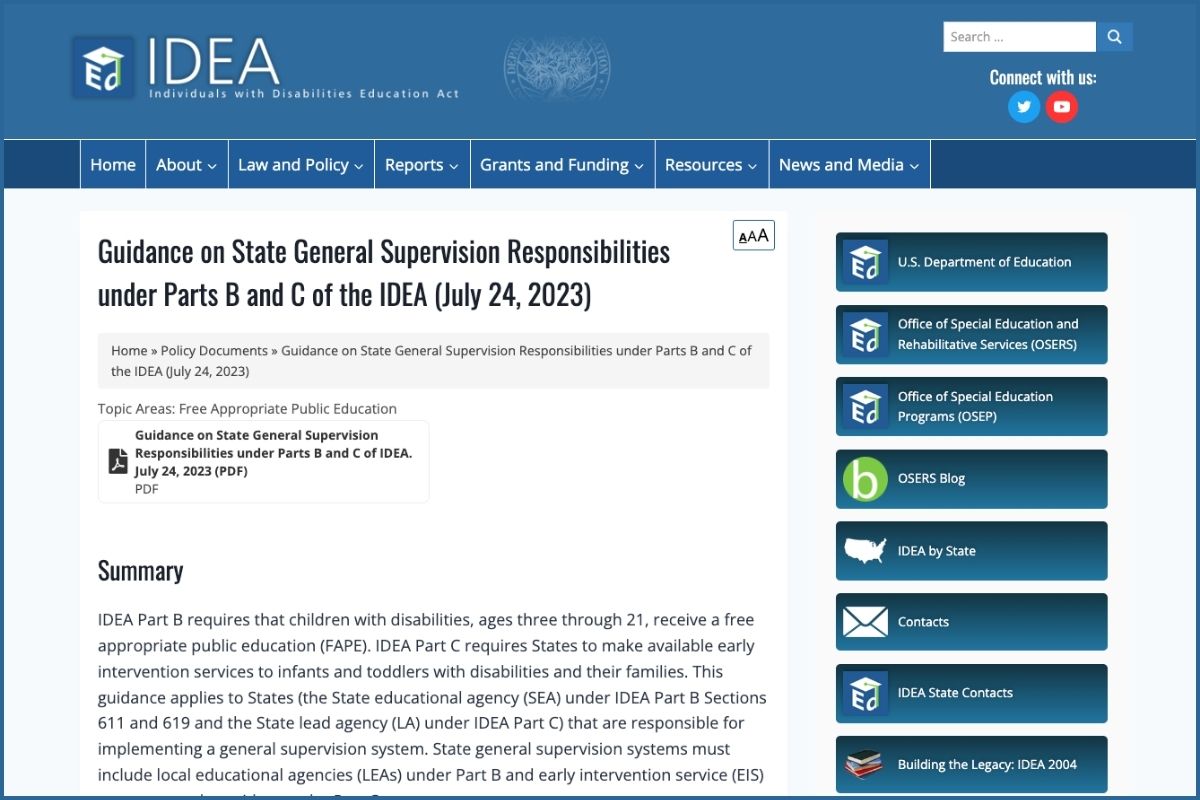On July 24, 2023, the U.S. Department of Education’s Office of Special Education Programs (OSEP) released updated policy guidance, which takes immediate effect, to ensure and strengthen the rights and protections guaranteed to children with disabilities and their families under the Individuals with Disabilities Education Act (IDEA).
OSEP’s press release begins:
“The guidance and accompanying Dear Colleague Letter address the IDEA’s ‘general supervision’ requirement, which necessitates states monitor local educational agencies (LEAs) as required by IDEA Part B, and early intervention service (EIS) programs and providers as required by IDEA Part C to ensure children with disabilities and their families access their rights under IDEA.
‘As a former special education teacher, administrator, and state special education director, I’ve experienced implementation of IDEA’s general supervision requirements at the state and local level and recognize the need to fortify the policy guidance,” said Glenna Wright-Gallo, Assistant Secretary for the Office of Special Education and Rehabilitation (OSERS), under which OSEP sits. “We must continue to Raise the Bar for all children. One vital component of this effort is to ensure children with disabilities, birth through age 21, receive the early intervention services and a free appropriate public education (FAPE) that meets their unique needs and prepares them for further education, employment, and independent living.'”
For more information, you can read the full press release, Dear Colleague Letter and the guidance itself.
These are some quotes from the guidance that we thought are likely particularly meaningful to parents:
- Two activities OSEP urges states to engage in: “1) Conducting interviews and listening sessions with parents of children with disabilities, children with disabilities, and other stakeholders to learn about an LEA’s (local districts and schools) or EIS (early intervention services program’s or provider’s implementation of IDEA, including functional outcomes and results”, and 2) “Examining information gleaned from the State’s dispute resolution system, including State complaints and due process complaints. The State’s complaint resolution system is a tool for States to identify and correct noncompliance as stated in Question A-7. Facts determined through the State’s resolution of State complaints and by impartial hearing officers when adjudicating due process complaints can provide the State with important information about an LEA’s or EIS program’s or provider’s implementation of IDEA requirements.” Remember – anyone, including parents, can file formal state complaints.
- “A State should inform stakeholders, including parents of children with disabilities and children with disabilities, about its general supervision systems and monitoring activities. This could include making available to the public (e.g., by posting on the State’s website) the State’s monitoring schedule, including the names and number of LEAs or EIS programs or providers monitored in a given year, the results of those monitoring activities (e.g., written monitoring reports) and any additional targeted monitoring activities (i.e., a monitoring activity that occurs outside of the State’s normal cycle to address emerging or new issues, and typically is limited in scope) that may have occurred.”
- “How should a State involve stakeholders, including parents, children with disabilities, and local-level staff in its monitoring activities? Answer: OSEP recommends that States involve stakeholders, including parents of children with disabilities, children with disabilities, and groups that represent the families and communities served by the LEAs or EIS programs or providers, as well as engaging OSEP-funded PTIs….. This engagement can occur through targeted interviews, conversations, and other appropriate means of collecting information (e.g., surveys, public and virtual meetings, State Advisory Panel (SAP) or State Interagency Coordinating Council (SICC) annual convenings). Information gathered from parents, providers, and local personnel can provide valuable insight to States about the LEAs or EIS program’s or provider’s activities related to the implementation of IDEA at the local level. “
- “When a State is made aware of an area of concern with an LEA or EIS program’s or provider’s implementation of IDEA, the State must conduct its due diligence in a timely manner to address the area of concern and reach a conclusion in a reasonable amount of time. A State’s proper due diligence activities may include but are not limited to: conducting clarifying legal research, interviewing staff, parents of children with disabilities, children with disabilities, and groups that represent the families and communities served by the LEAs or EIS programs or providers, and reviewing and analyzing data or information.”
In Mississippi, the State Department of Education is responsible for school districts abiding by this guidance. We, as families, have a real opportunity to partner with the department and hold it accountable for ensuring all of our children receive free and appropriate public education in their districts.

